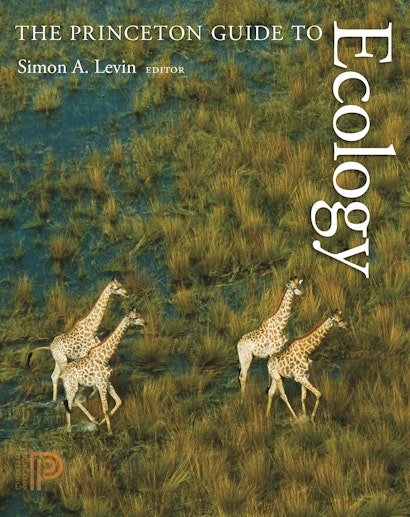The Princeton Guide to Ecology is a concise, authoritative one-volume reference to the field’s major subjects and key concepts. Edited by eminent ecologist Simon Levin, with contributions from an international team of leading ecologists, the book contains more than ninety clear, accurate, and up-to-date articles on the most important topics within seven major areas: autecology, population ecology, communities and ecosystems, landscapes and the biosphere, conservation biology, ecosystem services, and biosphere management. Complete with more than 200 illustrations (including sixteen pages in color), a glossary of key terms, a chronology of milestones in the field, suggestions for further reading on each topic, and an index, this is an essential volume for undergraduate and graduate students, research ecologists, scientists in related fields, policymakers, and anyone else with a serious interest in ecology.
- Explains key topics in one concise and authoritative volume
- Features more than ninety articles written by an international team of leading ecologists
- Contains more than 200 illustrations, including sixteen pages in color
- Includes glossary, chronology, suggestions for further reading, and index
- Covers autecology, population ecology, communities and ecosystems, landscapes and the biosphere, conservation biology, ecosystem services, and biosphere management
"Every ecology graduate student studying for their comprehensive examination needs this book. For that matter, every practicing ecologist interested in keeping up with aspects of the field, particularly outside of their own subdiscipline, would be well served to have this book on hand."—Jonathan M. Chase, Quarterly Review of Biology
"[A] content-rich volume presenting the diversity of ecology, from basic to applied."—Library Journal
"The Princeton Guide to Ecology is a comprehensive assemblage of contemporary ecological research studies and issues related to the different disciplines of the ecological sciences. . . . Technical information throughout the book is presented in a simple-to-understand manner; a comprehensive glossary facilitates further understanding of terminology/concepts. This volume will be useful to students as well as professionals in areas related to environmental health and public policy."—Choice
"Edited by eminent ecologist Simon Levin, with contributions from leading ecologists, the book explains key topics in more than ninety concise and authoritative articles."—Blackwells Recommends
"Because ecology and conservation are such hot topics as of late, this title could be useful to a number of people. The obvious choice is that of university libraries; however, researchers in the field, scientists in related fields, as well as policy makers and journalists could use this title in their work."—Shannon Graff Hysell, American Reference Books Annual
"I think that the most valuable contribution that this book makes is to integrate ideas across ecology, to showcase the diversity of ecology and to give that ecology currency."—John Morgan, Austral Ecology
"A long-needed sourcebook to the science so pertinent to the future, providing rich and eminently readable entries on all aspects of ecology—so valuable that it is hard to imagine how anyone managed without it."—Thomas E. Lovejoy, President, Heinz Center for Science, Economics and the Environment
"This is a synoptic survey of our still-advancing understanding of ecological science. It first deals with fundamental principles, ranging from individual plants or animals through populations and ecosystems to entire landscapes. These principles are then applied in insightful discussions of conservation biology, ecosystem services, and ultimately the sustainable management of our planet's biosphere. The 'autecology' of this book is itself remarkable, as tight editing has drawn together contributions from more than one hundred individual authors into a unified whole. In short, the book is a timely and important one."—Robert M. May, University of Oxford
"Essential reading for biologists, social scientists, and all interested in a holistic view of the world, this marvelous collection presents the flourishing state of ecology today and its even more exciting prospects for the future."—Peter H. Raven, President, Missouri Botanical Garden
"The Princeton Guide to Ecology is an exciting development because it brings together in one place accessible articles written by the leading experts across the important field of ecology. Ecology has grown and repeatedly subdivided in recent years, but now we have it back together again with this enormously useful framework and compendium."—James Gustave Speth, Dean, Yale School of Forestry & Environmental Studies




